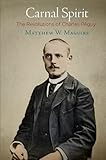Carnal Spirit : The Revolutions of Charles Peguy / Matthew W. Maguire.
Material type: TextPublisher: Philadelphia : University of Pennsylvania Press, [2019]Copyright date: ©2019Description: 1 online resource (296 p.)Content type:
TextPublisher: Philadelphia : University of Pennsylvania Press, [2019]Copyright date: ©2019Description: 1 online resource (296 p.)Content type: - 9780812296105
- 848.91209 23
- PQ2631.E25 M348 2019
- online - DeGruyter
| Item type | Current library | Call number | URL | Status | Notes | Barcode | |
|---|---|---|---|---|---|---|---|
 eBook
eBook
|
Biblioteca "Angelicum" Pont. Univ. S.Tommaso d'Aquino Nuvola online | online - DeGruyter (Browse shelf(Opens below)) | Online access | Not for loan (Accesso limitato) | Accesso per gli utenti autorizzati / Access for authorized users | (dgr)9780812296105 |
Frontmatter -- Contents -- Introduction -- Chapter 1. Modernity, Antimodernity, and Beyond -- Chapter 2. His Youth -- Chapter 3. An Answer to the Question: What Is Modernity? -- Chapter 4. The Revolution of Critique -- Chapter 5. Revolutions of the Body and Work -- Chapter 6. Continuity and Revolution: War and Honor -- Chapter 7. Universal Particulars, Particular Universalities -- Chapter 8. Mysticism and Politics -- Chapter 9. The Style of Infinite Reality -- Chapter 10. The Christian Revolution -- Chapter 11. Despair and Exaltation -- Conclusion -- Notes -- Index -- Acknowledgments
restricted access online access with authorization star
http://purl.org/coar/access_right/c_16ec
It is rare for a thinker of Charles Péguy's considerable stature and influence to be so neglected in Anglophone scholarship. The neglect may be in part because so much about Péguy is contestable and paradoxical. He strongly opposed the modern historicist drive to reduce writers to their times, yet he was very much a product of philosophical currents swirling through French intellectual life at the turn of the twentieth century. He was a passionate Dreyfusard who converted to Catholicism but was a consistent anticlerical. He was a socialist and an anti-Marxist, and at once a poet, journalist, and philosopher.Péguy (1873-1914) rose from a modest childhood in provincial France to a position of remarkable prominence in European intellectual life. Before his death in battle in World War I, he founded his own journal in order to publish what he thought most honestly, and urgently, needed to be said about politics, history, philosophy, literature, art, and religion. His writing and life were animated by such questions as: Is it possible to affirm universal human rights and individual freedom and find meaning in a national identity? How should different philosophies and religions relate to one another? What does it mean to be modern?A voice like Péguy's, according to Matthew Maguire, reveals the power of the individual to work creatively with the diverse possibilities of a given historical moment. Carnal Spirit expertly delineates the historical origins of Péguy's thinking, its unique trajectory, and its unusual position in his own time, and shows the ways in which Péguy anticipated the divisions that continue to trouble us.
Mode of access: Internet via World Wide Web.
In English.
Description based on online resource; title from PDF title page (publisher's Web site, viewed 21. Jun 2021)


